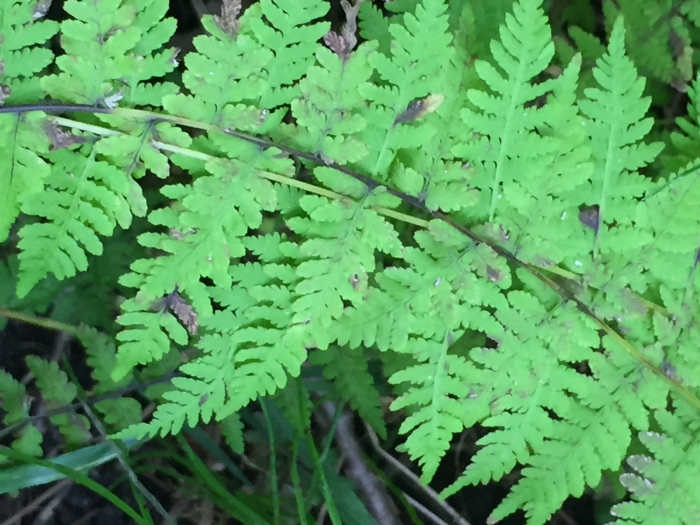Bulblet Bladderfern
(Cystopteris bulbifera)
Bulblet Bladderfern (Cystopteris bulbifera)
/
/

askalotl
Public Domain
Image By:
askalotl
Recorded By:
Copyright:
Public Domain
Copyright Notice:
Photo by: askalotl | License Type: Public Domain | License URL: http://creativecommons.org/publicdomain/zero/1.0/ | Rights Holder: askalotl | Publisher: iNaturalist | Date Created: 2018-09-19T16:37:23Z |

















































Estimated Native Range
Summary
Cystopteris bulbifera, commonly known as Bulblet Bladderfern, is a deciduous fern native to rich, moist, deciduous forests and rocky woodlands in the United States and parts of Southern Canada. It thrives in the dappled shade of forest understories and on limestone bluffs. This fern typically grows to 75 cm (30 in) and features narrow, elongate deltate fronds that are light green and delicate in appearance. The fronds bear distinctive bulblets on their undersides, which can fall off and grow into new plants, making this species one of the easiest Cystopteris to identify and propagate.
Bulblet Bladderfern is valued for its unique reproductive strategy and its ability to thrive in shaded rock gardens and woodland settings. It is often used to add texture and interest to shaded areas, and its bulblets offer an easy means of propagation. While it prefers moist, humus-rich soils, it is adaptable to a range of soil drainage conditions, from slow to fast. It is important to note that this fern requires consistent moisture and should not be allowed to dry out. It is not commonly affected by diseases, but overwatering can lead to root rot. Due to its non-invasive nature, it is a safe choice for cultivation in areas outside its native range.CC BY-SA 4.0
Bulblet Bladderfern is valued for its unique reproductive strategy and its ability to thrive in shaded rock gardens and woodland settings. It is often used to add texture and interest to shaded areas, and its bulblets offer an easy means of propagation. While it prefers moist, humus-rich soils, it is adaptable to a range of soil drainage conditions, from slow to fast. It is important to note that this fern requires consistent moisture and should not be allowed to dry out. It is not commonly affected by diseases, but overwatering can lead to root rot. Due to its non-invasive nature, it is a safe choice for cultivation in areas outside its native range.CC BY-SA 4.0
Plant Description
- Plant Type: Fern
- Height: 1-2 feet
- Width: 1-2 feet
- Growth Rate: Rapid
- Flower Color: N/A
- Flowering Season: Non-Flowering
- Leaf Retention: Deciduous
Growth Requirements
- Sun: Part Shade, Full Shade
- Water: Medium
- Drainage: Fast, Medium, Slow
Common Uses
Deer Resistant, Rock Garden
Natural Habitat
native to rich, moist, deciduous forests and rocky woodlands
Other Names
Common Names: Bulblet Fern , Bulb Bladderfern , Bulblet Bladder Fern , Berry Fern , Bulb Bladder Fern , Bulblet Fern , Bulblet Fragile Fern , Cystoptère Bulbifère , Cystoptéride Bulbifère , Kvickbräken
Scientific Names: Cystopteris bulbifera , Athyrium bulbiferum , Aspidium bulbiferum , Cyathea bulbifera , Aspidium atomarium , Polypodium bulbiferum , Cystopteris bulbifera f. bulbifera , Cystopteris bulbifera f. crispa , Filix bulbifera , Athyrium atomarium
GBIF Accepted Name: Cystopteris bulbifera (L.) Bernh.